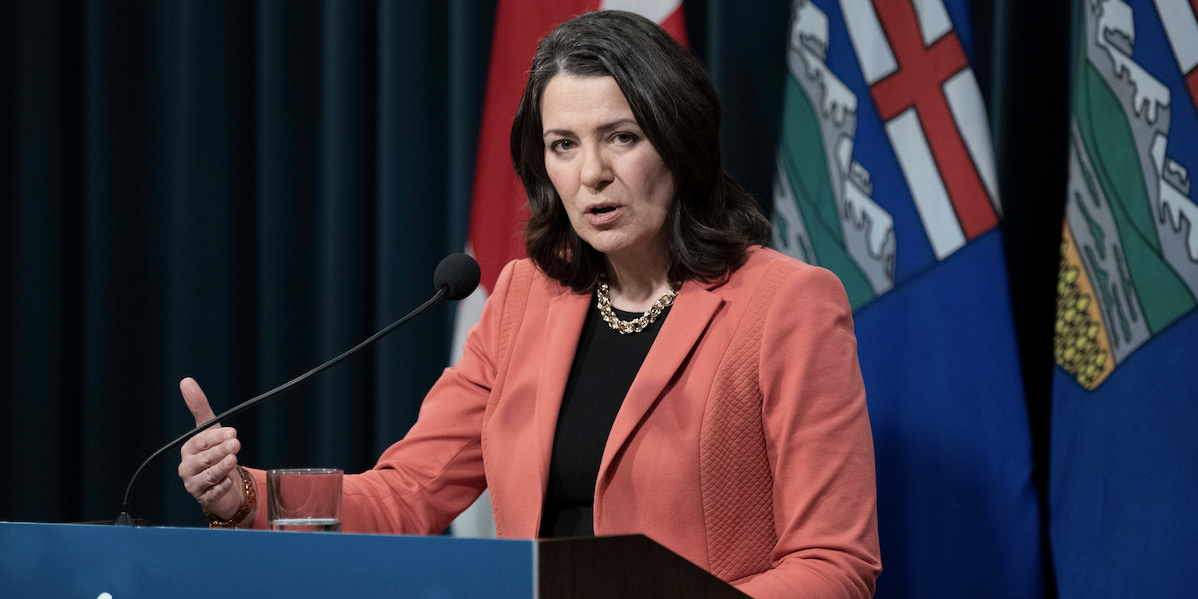Alberta Premier Danielle Smith is a master of the politician’s black art of not answering questions directly. As she embarks on a crucial month-long provincial election campaign, she seems to be doubling down to limit her government’s accountability. She has announced that news outlets will be able to ask only one question each at her news conferences, and follow-up questions will not be allowed at all.
I repeat: For the duration of the election campaign.
Why is questioning politicians, and in particular being able to ask them follow-up questions, important to democracy? They enable reporters to clarify or pin down what politicians really mean and what they really stand for. Without the ability to be questioned freely, politicians can—and will—obfuscate, minimize, misdirect, mislead and evade accountability, denying voters a full understanding of their policies and actions. A favourite tactic is to ignore the thrust of the original question and pivot to give a partial answer or mount an attack on political opponents.
Smith gave a good example of this just the other day. She was asked what role Take Back Alberta, a controversial populist group, will play in her election campaign. She replied only that her party, the United Conservatives, is a “one member, one vote” party where everyone has a say. Not only did she not answer the question, she did not allow a follow-up.
That certainly did not address the rising alarm of some Albertans that the group, which grew out of last year’s violent anti-vax truck protest at Coutts, Alberta, is wielding too much influence. Take Back Alberta is a coalition of Christian nationalists, separatists and disgruntled rural Albertans. They were instrumental in the United Conservative Party (UCP)’s leadership review which unseated former premier Jason Kenney, they championed Danielle Smith as his replacement, and by all accounts they have taken effective control of the party.
Voters have a very real interest in knowing more. Take Back Alberta is headed by longtime Conservative organizer David Parker, who has said “My creed is very simple. I have one rule. Don’t mess with my friends.”
The group also has a connection to the trucker protest that paralyzed Ottawa and led to the imposition of the National Emergency Act. Roy Beyer, an organizer of that rally, sits in the inner circle of Take Back Alberta. He sees the Alberta election as a religious crusade—about “faith, family and freedom.”
The election campaign in Alberta doesn’t officially begin until May 1 but the political manoeuvring is already under way. For Smith, it’s her first election as leader. She says her limit on questioning is designed to allow more questions from different news outlets. But it can only be seen as an attempt to limit questions from larger and better resourced media outlets like the CBC, Edmonton Journal and Calgary Herald, which still have the capacity to follow government closely and do investigative work. Her rules open the way to more questions from marginal outlets like the right-wing Western Standard, which has a record of printing erroneous or misleading stories and generated headlines in 2006 when it published unflattering cartoons of the Prophet Muhammad. In the same tweet he announced the limits, Smith’s executive assistant Rob Anderson more or less let the cat out of the bag: “Albertans should prepare themselves for continuous mainstream media bias for the next six weeks.”
It will be interesting to see how Alberta’s media respond to Smith’s clampdown. Let’s hope they refrain from disrupting press conferences by rudely shouting out follow-up questions that won’t be answered, behaviour that will convince some people they are a rabble deserving of being kept on a leash. My suggestion is for Alberta’s news media to start recording for voters, on a daily basis, all the questions Smith refused to answer or that she answered unsatisfactorily.
Smith is clearly taking a page out of Stephen Harper’s handbook. The former Conservative prime minister used to travel with the national press but once stipulated that he would answer only four questions at his press conferences—and one had to come from whatever local media outlet existed there. In other words he was more comfortable answering questions about local interests than he was about questions of national substance. Tory fundraising efforts usually complained about a “media elite” that Harper’s spokespeople said was trying to undo everything his government stood for.
Smith’s main opponent, the NDP’s Rachel Notley, has put no limits on questions from journalists and says if Smith doesn’t wish to answer questions she shouldn’t be premier.
Guess we’ll have to wait until May 29 to find out the answer to that one.



